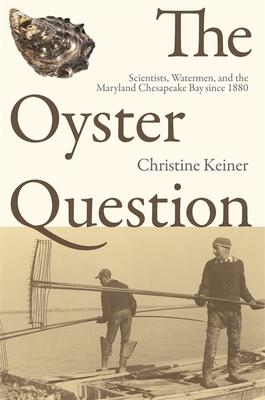In The Oyster Question, Christine Keiner applies perspectives of environmental, agricultural, political, and social history to examine the decline of Maryland's iconic Chesapeake Bay oyster industry.
Oystermen have held on to traditional ways of life, and some continue to use preindustrial methods, tonging oysters by hand from small boats. Others use more intensive tools, and thus it is commonly believed that a lack of regulation enabled oystermen to exploit the bay to the point of ruin. But Keiner offers an opposing view in which state officials, scientists, and oystermen created a regulated commons that sustained tidewater communities for decades. Not until the 1980s did a confluence of natural and unnatural disasters weaken the bay's resilience enough to endanger the oyster resource. Keiner examines conflicts that pitted scientists in favor of privatization against watermen who used their power in the statehouse to stave off the forces of rural change. Her study breaks new ground regarding the evolution of environmental politics at the state rather than the federal level. The Oyster Question concludes with the impassioned ongoing debate over introducing nonnative oysters to the Chesapeake Bay and how that proposal might affect the struggling watermen and their identity as the last hunter-gatherers of the industrialized world.
Book
The Oyster Question: Scientists, Watermen, and the Maryland Chesapeake Bay Since 1880
(Write a Review)
Paperback
$34.96
In The Oyster Question, Christine Keiner applies perspectives of environmental, agricultural, political, and social history to examine the decline of Maryland's iconic Chesapeake Bay oyster industry.
Oystermen have held on to traditional ways of life, and some continue to use preindustrial methods, tonging oysters by hand from small boats. Others use more intensive tools, and thus it is commonly believed that a lack of regulation enabled oystermen to exploit the bay to the point of ruin. But Keiner offers an opposing view in which state officials, scientists, and oystermen created a regulated commons that sustained tidewater communities for decades. Not until the 1980s did a confluence of natural and unnatural disasters weaken the bay's resilience enough to endanger the oyster resource. Keiner examines conflicts that pitted scientists in favor of privatization against watermen who used their power in the statehouse to stave off the forces of rural change. Her study breaks new ground regarding the evolution of environmental politics at the state rather than the federal level. The Oyster Question concludes with the impassioned ongoing debate over introducing nonnative oysters to the Chesapeake Bay and how that proposal might affect the struggling watermen and their identity as the last hunter-gatherers of the industrialized world.Paperback
$34.96